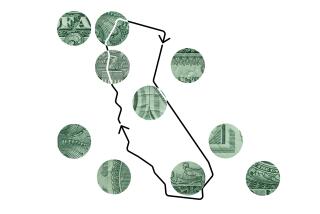Unmasking the most influential billionaire in U.S. politics
Who’s the most influential billionaire business figure in national politics?
If you answered one of the Koch brothers (Charles or David) or George Soros, you’re wearing your partisan blinders. The former are known for their devotion to conservative causes, the latter to liberal. In either case, you’re wrong.
The most influential billionaire in America is Peter G. Peterson. The son of Greek immigrants, Peterson, 86, served as Commerce secretary under President Nixon, then became chairman and chief executive of Lehman Bros. Subsequently, he made his big money as co-founder of the Wall Street private equity firm Blackstone Group.
Peterson doesn’t attract venom from the left like the Koch family or bile from the right like Soros. In Washington, he’s treated with sedulous respect as a serious thinker about public policy willing to support earnest public discussion with cold cash. His money backs a large number of think tanks across the political spectrum; he has started a news outlet churning out articles about fiscal matters and is funding a high school curriculum aimed, according to its creators at Columbia University, at “teaching kids about the national debt.”
INTERACTIVE: Outside spending shapes 2012 election
Peterson’s views are subtly infiltrating the Washington debate — which is why Americans should start getting worried about him.
He isn’t content merely to express concern about the federal deficit. His particular targets are Social Security, Medicare and Medicaid, which he calls “entitlement” programs and which he wants to cut back in a manner that would strike deeply at the middle class.
Many beneficiaries of Peterson grants are, like the high school syllabus, initiatives sounding the alarm on the federal deficit. And although everyone agrees that too much borrowing can be bad for the country, the real question is what to do about it.
It’s a measure of Peterson’s achievement that for Washington Republicans and Democrats alike, the idea that social insurance programs such as Medicare and Social Security desperately and urgently need “reform” has become a foundation stone of the debate, even though Peterson’s evidence can be misleading and his contentions questionable. That points to the question of whose interests Peterson is really promoting when he talks about ratcheting back programs that were designed from their inception as universal benefits.
Peterson hasn’t flown entirely under the radar; indeed, some of his beneficiaries have started to play down their associations with him. That’s the case with the Comeback America Initiative, an anti-deficit program founded by David Walker, a former U.S. comptroller general who headed the Peter G. Peterson Foundation from 2008 to 2010. A significant portion of the group’s budget comes from a three-year $3.1-million Peterson Foundation grant. But when Walker embarked on a nationwide bus tour to sound the deficit alarm, he took pains to insist that Peterson had nothing to do with funding it, even though the tour is running under the Comeback America banner.
The reason: “Pete’s a great man, he’s done great work, but he’s also a lightning rod,” Walker told me.
Walker attributes some of the lightning to Peterson’s background as a Republican and a Wall Street billionaire. He adds, “Pete’s focused on reforming social insurance programs, and that’s gotten some elements of the left exercised.”
Still, Peterson’s influence in national politics stems largely from his ability to make his interests appear eclectic and nonpartisan. That allows intellectuals and luminaries of all political creeds to feel comfortable in the Peterson Foundation’s capacious shade, displaying their public spirit as if it’s a perk of eminence. The foundation’s advisory board includes as members former New York Gov. Mario Cuomo; Facebook Chief Operating Officer Sheryl Sandberg; former Secretary of State George Shultz (a Republican) and former Treasury Secretary Robert Rubin (Democrat); former Federal Reserve Chairman Paul Volcker; and “60 Minutes” correspondent Leslie Stahl.
The foundation’s roster of grant recipients has been similarly eclectic: the right-wing Heritage Foundation and the liberal Brookings Institution. The progressive Center for American Progress, the free-market American Enterprise Institute and the pro-union Economic Policy Institute. The independent public interest news organization ProPublica.
It might be churlish to say these organizations have been co-opted by Peterson money; let’s just observe that sowing largesse so widely may help ensure that any criticism of Peterson’s activities remains respectful and judicious.
On the other hand, his connections can be hard to keep straight: In 2009, for example, the Washington Post published a news article talking up an ostensibly independent effort to create a bipartisan deficit-cutting commission in Washington. The piece included approving comments from Robert L. Bixby, executive director of the “nonpartisan” Concord Coalition. What wasn’t disclosed is that the Concord Coalition was funded and co-founded by Pete Peterson, and that the article itself had been provided to the Post by Fiscal Times, the news outlet launched by, yes, Pete Peterson.
The avoidance of overt political partisanship enables Peterson to engage in something more insidious: economic partisanship. That’s what makes it worthwhile to examine his approach to Social Security, Medicare and Medicaid, and how it has spread.
Peterson declined to be interviewed for this column. But his views on “entitlement reform” have been set forth in writing often, perhaps most clearly in a 1994 article in the New York Review of Books. There he praised President Clinton for his budget-cutting but damned him for promising Americans “broad new entitlements in health, employment, retirement and education.” Peterson urged instead “putting an end to the vast and largely unearned windfall we now give to the more affluent half of all American households.”
That prescription encompasses several feats of legerdemain. For one thing, most recipients of Social Security and Medicare have spent their lives earning the benefits through payroll taxes. For another, the fiscal issues faced by Social Security and Medicare are distinguishable — Social Security is not facing an immediate crisis and may not for decades; Medicare’s crisis stems entirely from the externality of rising healthcare costs. Finally, “more affluent” is not synonymous with “affluent”: the “more affluent half” of U.S. households in 1994 were those earning $32,000 or more, according to the Census Bureau. That would be $48,418 in today’s dollars. Today, the median figure is about $50,000, which shows that the average American family hasn’t progressed much over that time.
Nevertheless, Peterson argued that too much money was going to the “middle class.” He defined that segment as households earning $30,000 to $200,000, “which, however, hard-pressed, cannot claim to be destitute.” He observed that cutting off entitlement outlays to these recipients “would balance the budget, and would so with a comfortable surplus to spare.”
Peterson still argues that the typical person bearing such cuts would scarcely feel them. In a video interview posted on the foundation website, he states, “A substantial part of these retirement payments go to people like me.”
Well, not really. The $1.14 billion in Social Security payments that went to recipients earning $1 million or more in 2009 amounted to 17-hundredths of 1% of all benefits paid out.
Walker says Peterson has refined his approach to the deficit over time: “He’s diversifying. He’s funded things dealing with defense and other spending, and he recognizes now that healthcare costs are the main driver” of federal deficits. Walker, whose organization plainly remains part of the Peterson family circle (notwithstanding the bus tour), says that “it’s flat not true that his desire is to slash the social safety net.... But he recognizes, as does any knowledgeable person, that you’ve got to reform those programs as part of a comprehensive grand fiscal bargain.”
Walker’s own initiative, like others carrying the Peterson imprimatur, properly acknowledges that fiscal responsibility requires tax increases as well as spending cuts, though people can argue in good faith about how to balance the two. But the hallmark of Peterson’s worldview is to view social insurance programs such as Social Security and Medicare strictly as fiscal expense items, ignoring their roots as moral commitments to American citizens that cross generations and unite economic classes.
These programs form the warp and woof of the American fabric. Portraying them, as Peterson does, as “safety net” initiatives that have outlived their relevance for all but the most destitute Americans is an artful way of destroying their universal appeal.
The danger in the economic debate in Washington comes from treating our fiscal problems as if they spring from the structure of our emblematic public social insurance programs, when the truth is that ill-advised tax cuts and unrestrained military spending have played a more important role.
The shame of Washington, on the other hand, comes from the fact that almost every organization promoting the grand fiscal bargain in which those programs will be on the table has accepted, somewhere and somehow, money from Pete Peterson.
Michael Hiltzik’s column appears Sundays and Wednesdays. Reach him at mhiltzik@latimes.com, read past columns at latimes.com/hiltzik, check out facebook.com/hiltzik and follow @latimeshiltzik on Twitter.







